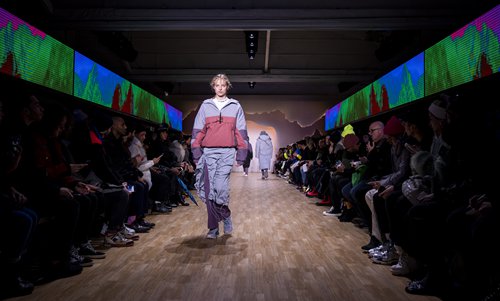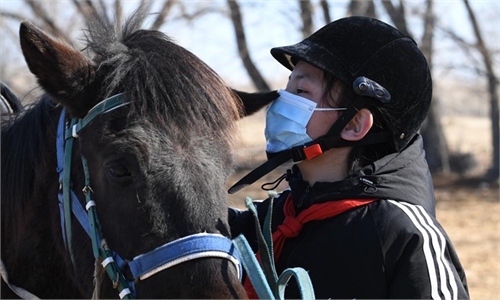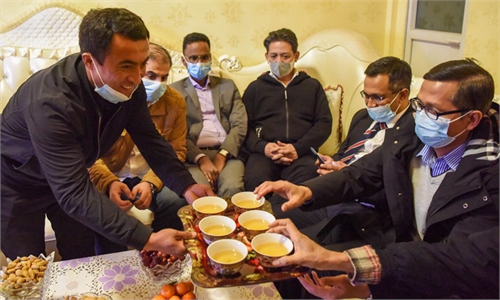Chinese scalpers shift focus to domestic sneakers
Shunning foreign brands over Xinjiang cotton

Models take to the runway for the Li-Ning show during New York Fashion Week on February 12. Photo: AFP
As the stances of some global sportswear brands - including Nike and Adidas - toward cotton grown in Northwest China's Xinjiang Uygur Autonomous Region have caused a backlash, the money and scalpers behind special edition shoes designed by these companies are shifting to domestic brands such as Li-Ning and Anta to avoid risks, the Global Times learned.
In recent days, the names of some shoes of Chinese brands such as the Li-Ning Way of Wade 4 - basketball shoes jointly designed by Chinese sportswear supplier Li-Ning and NBA star Dwyane Tyrone Wade - have made headlines in Chinese news outlets for their sky-high prices on secondhand shoe trading platforms.
For example, the listed price of the "All-star" version of Li-Ning Way of Wade 4 on Dewu - a Chinese fashion shoe-trading platform where people can buy limited editions at prices far above the official prices - is 48,889 yuan ($7,444) per pair, 31 times higher than the official price of 1,499 yuan, although no sales have been recorded.
The price of Chinese sportswear producer Anta's Doraemon-themed casual shoes on the platform was sold at 4,599 yuan - eight times higher than the original price of 499 yuan.
Normally, money and scalpers that specialize in fancy shoes tend to speculate on foreign brands such as the Jordan 1 - a series of basketball shoes jointly designed by Nike and NBA legend Michael Jordan - a seasoned collector surnamed Sun who owns more than 200 pairs of shoes told the Global Times on Monday.
"But after the Xinjiang cotton incident, the risks of speculating on these brands caused by market uncertainties due to their vague attitude are growing, so many scalpers are shifting to domestic brands to avoid risks. This should be the main reason," Sun said.
"The cooling of speculation on foreign-brand shoes was due to the controversy surrounding Xinjiang cotton. The market needs new 'stories' and has made a great adjustment, which gives first-tier domestic brands like Li-Ning and Anta opportunities," Zheng Yexin, brand administration manager of Chinese sportswear company 361 Degrees, told the Global Times on Monday.
Zheng added that local sports shoes entering the collectors' market is a sign that young Chinese consumers are paying more attention to domestic brands. Chinese brands are improving their quality and creating 'stories' about their products, such as releasing limited editions and jointly designed sneakers.
Despite the price hike, people should have a rational view of the trend, Zheng said.
"The high-priced 'All-star' version of Li-Ning Way of Wade 4 is a limited edition released years ago. So, the high price is due to the limited supply and low availability on the market," a sneaker analyst surnamed Zhang told the Global Times on Monday.
"When I was in Toronto, only 11 pairs were released in the city, so it's normal for the price to be high. In addition, as collectors who own the shoes are unlikely sell them, it would be hard to buy a pair even if the price was affordable," Zhang said, adding that the list price on the trade platform is more like an eye-catching promotion tactic.
Normally, shoe scalpers, backed by capital, will stockpile versions that have their own stories or culture, which could mean market shortages.
"Then, after market prices go higher than the official prices, they'll sell their stockpiles for a profit, which is a lucrative business now," said Sun, who has spent more than 200,000 yuan on collecting limited editions of shoes.
Speculation involving special editions has driven up prices of some common models as well, drawing complaints from ordinary customers who said that it's hard to get a pair of normal shoes for an affordable price.
An user of Weibo, a Twitter-like Chinese social media, said that "the price of a pair of shoes that I brought for my boyfriend increased 200 yuan in half month," joking that "maybe I should join the shoe scalpers."
Another user said that shoes should be worn instead of being collected, as most buyers of domestic shoes are just ordinary people, and soaring prices for normal shoes will affect their quality of life.
"Young customers should remember the risks in this latest wave of soaring prices of domestic brands' sneakers, as scalping shoes has uncertainties. They should evaluate the value of shoes they like and avoid blind purchases that are linked to sales trends," Zheng said, adding that brands should continuously create more high-quality products to meet market demand.



